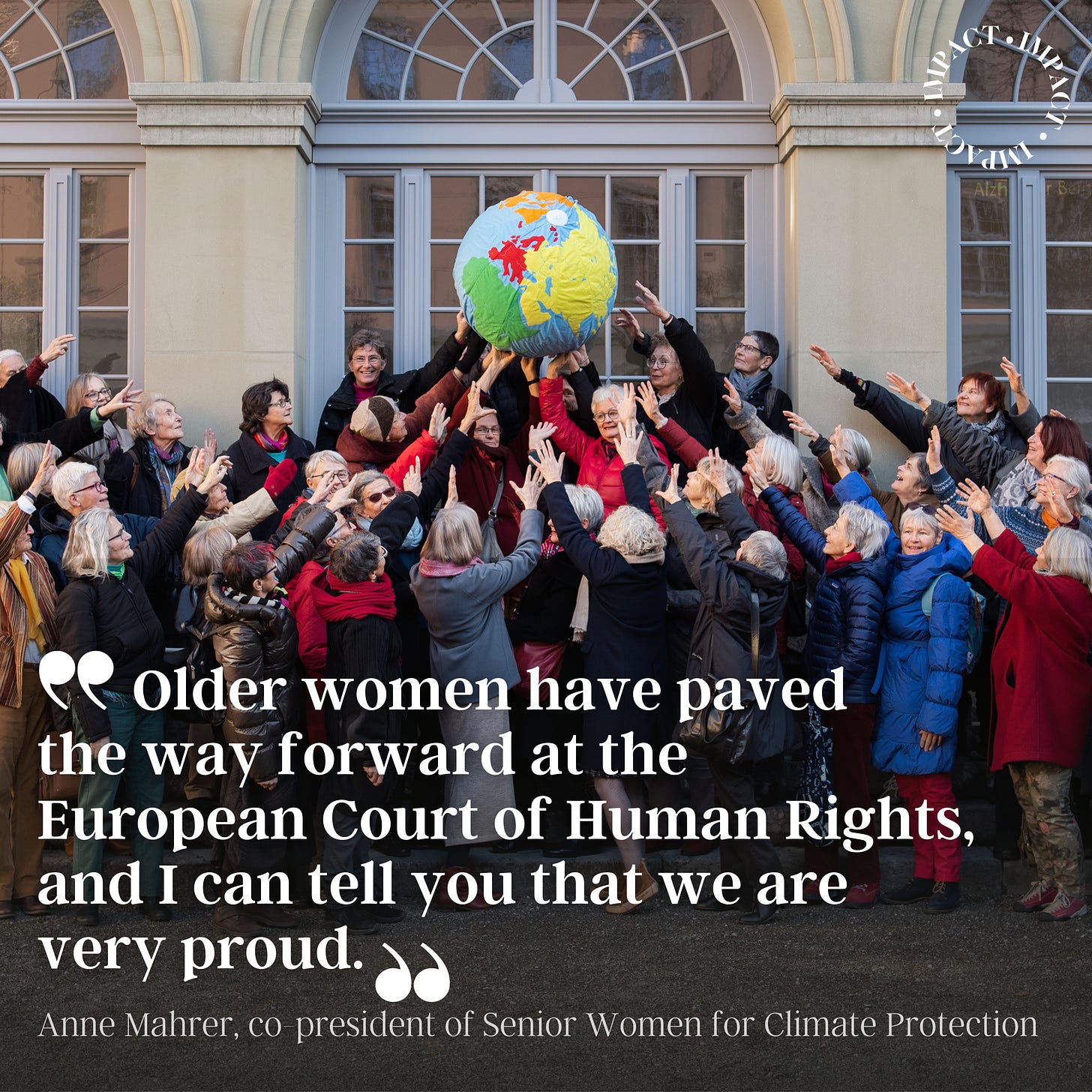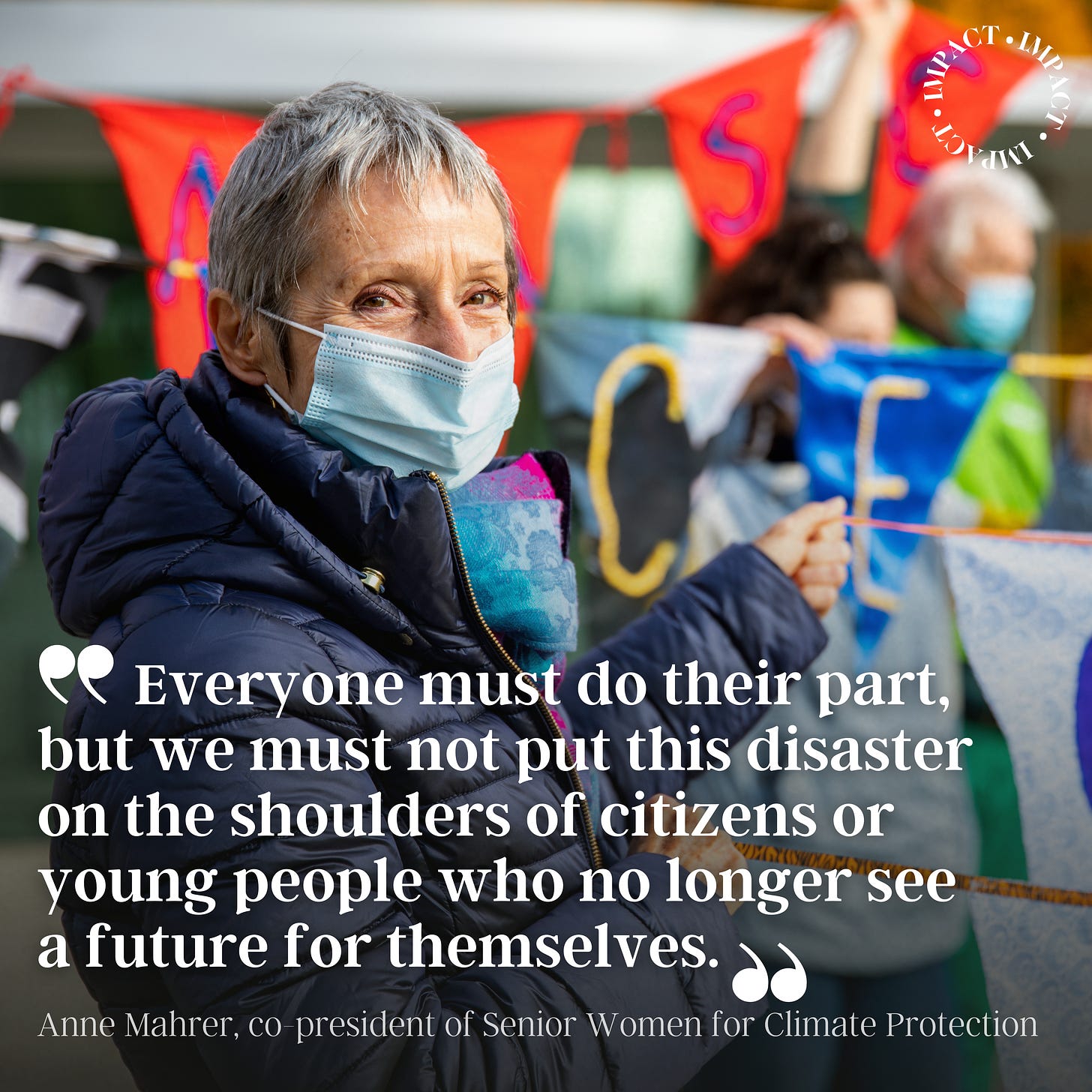Swtizerland’s loudest climate activists are women over 60
… and they’re suing their government
Only have a minute to read this newsletter? Here it is in brief:
- 🇨🇭A group of older women in Switzerland are taking their government to court in the country’s first major climate case.
- 🏭 The women claim the government is violating their human rights as a vulnerable group by failing to lower emissions and prevent catastrophic global heating.
- 🌱 The group’s president tells the Impact newsletter why a win for older women is a win for all.
Read on for more. And if you want to be up-to-date on feminism worldwide, follow us on Twitter and Instagram.
Parlez-vous français ? Impact is also available in French:
By Megan Clement
The world’s most prominent voices on climate change belong to the young: those whose futures are undoubtedly most at stake. But the people behind Switzerland’s first major climate lawsuit are a group of more than 2,000 women with an average age of 73.
They are Senior Women for Climate Protection, and they are suing their government in the European Court of Human Rights over its failure to reduce greenhouse gas emissions. Their argument is that the climate crisis is happening now, and that older women are squarely in the crosshairs.
A decision in the women’s favour could set a precedent for each of the 46 member states of the Council of Europe on sticking to the commitments of the Paris Agreement, which holds that global warming should ideally be limited to 1.5 degrees.
When the organisation’s co-president, Anne Mahrer, reached the age where most careers end, “the climate emergency was such that I could not retire,” she says. So in 2016, she and her colleagues founded Senior Women for Climate Protection, which has a minimum age of 63 for membership.
Mahrer, now 74, had previously spent decades in Swiss politics, driven in part by the country’s very recent history of gender discrimination. “When I was 20 years old, I didn’t have the right to vote at the national level because I was a woman,” she says — Switzerland only granted women the right to vote in 1971. “That’s one of the reasons for my activism and also for my very early awareness of the environmental problem.”
The suit is being heard in the court’s Grand Chamber, which is reserved for issues of the most serious importance. The women’s case rests on a claim that the government is breaching their fundamental rights to health and well-being by failing to adequately address global warming because older women are most at risk during heat waves.
“Everyone suffers in major heatwaves,” Mahrer says. “But older women’s health is particularly affected from a cardiac, respiratory and cardiovascular point of view.”
Mahrer spoke to the Impact newsletter about the climate emergency, the case against the Swiss government and how to build solidarity across generations. The interview has been edited for length and clarity.
Megan Clement — Climate change is generally seen as an issue for young people. Why is it also important for older women?
Anne Mahrer — Because it particularly affects our health. Because our fundamental rights in the European Convention on Human Rights — Article 2 and Article 8 in particular, which say that we have the right to privacy, to life and to health — are being violated by our states. Switzerland is particularly affected, as an Alpine country. We are already above 1.5°C [of warming]. Switzerland signed the Paris Agreement and does not respect it. The rights to health, life and a healthy environment are also very much in evidence in our Swiss constitution. None of this is being respected. The role of the state is to protect its population, but that is not happening.

Megan Clement — What measures are you asking the Swiss government to take to combat climate change?
Anne Mahrer — We want the government to review its law on CO₂ and the climate and take extremely strong measures not to exceed 1.5°C of warming. Our glaciers are in a terrible state; we’re going to have problems with water and we’re not the only ones. Our glaciers feed our rivers, and there are several large European rivers whose source is in Switzerland, so it’s a huge responsibility.
There are measures that we know we can take to deal with this without any problems. We have to work on buildings, we have to create jobs, we have to work on transport, we have to work on agriculture and all these measures have to be taken at the federal level. Everyone must do their part, that’s clear, but we must not put this disaster on the shoulders of citizens or young people who no longer see a future for themselves. I meet many of them. I follow them. I have followed the trials of young Swiss activists who are convicted, which is scandalous, because it’s not young activists who we should be condemning. We know who we should condemn, and it’s the gravediggers of their future: the multinationals, the big banks, the pension funds.
Megan Clement — What would be the consequences of a decision in your favour in the court?
Anne Mahrer — The consequences will not only be felt in Switzerland. If the court takes a courageous decision and says we must reconsider our position and put in place ambitious laws, this would set a precedent for all the countries of the Council of Europe, because the court’s ruling is binding. And if the countries concerned do not implement the court’s decision, it remains on the agenda and the Council of Ministers, which is made up of the foreign ministers who meet four times a year, will remind the countries concerned to do their jobs.

Megan Clement — Is your movement also a way to fight against the way older women are often rendered invisible in society?
Anne Mahrer — At first, it probably wasn’t. But our case became so big that it pushed older women and their convictions to the forefront by showing that they too were committed, and that if they won at the European Court, everyone won: young, old, all generations together. It made us much more visible.
But if older women are not visible, it is the consequence of the fact that women are not visible. Sadly, it’s a logical consequence of our female condition. When you’re older, there’s a double penalty because, as we all know, you have to be young, dynamic and correspond to the stereotypes that the media and social media project onto us. As a result, older women are no longer of interest to anyone. But older women have paved the way forward at the European Court of Human Rights and I can tell you that we are very proud.
Megan Clement — Do you consider your movement and your case as part of a tradition of ecofeminism?
Anne Mahrer — Maybe not directly. What I see among all our members is that the majority are women who are engaged by force of circumstance — women who became activists because not only did we not have the right to vote, we also did not have the right to sign a lease, nor the right to have a bank account. It was monstrous. So these are very committed women, not necessarily in politics, but at different levels in volunteer organisations or in their personal life. There is a commitment, even if it’s not under the label of eco-feminism.
Megan Clement — How do you build intergenerational solidarity on climate issues in your movement?
Anne Mahrer — There is a real solidarity. Young people have invited us to their primary schools, their high schools, their universities and their demonstrations to talk about our legal action, since it is a first in Switzerland and that interests them. We are always very well received. They say, “thank you for doing what you do,” because many are very discouraged. I meet a lot of very discouraged young people and that really worries me. It motivates me all the more to succeed and to move forward.
I have also had exchanges with students who have said “You are selfish, you are only doing this for your own health. Baby Boomers are the ones who screwed everything up.” I told them: “You’re not wrong. It’s true that we Baby Boomers were all about cars, planes, oil, fossil fuels, industrialization, and over-consumption.” Afterwards, I told them that maybe we shouldn’t put everyone in the same basket. I told them in a few words that I had been involved [in environmental issues] for decades. But it’s true that there have been monumental errors and that we have a responsibility. We take it, we do our part, we assume our responsibility and it leads to very interesting debates and discussions.

Megan Clement — I ask this question of all the people I interview: how do you maintain hope in your activism?
Anne Mahrer — I have immense hope to have reached this point, even if it hasn’t been a smooth journey, even if we might still receive an unfavourable decision. I want to see the glass as half-full rather than always half empty. Young people are told over and over again that it’s a disaster. And it is a disaster. These are crises. I think there is a tendency, particularly in politics, to look at all this in silos. But in fact, this climate crisis, like the COVID crisis that we have experienced, is also because everything, absolutely everything, from biodiversity to climate to the environment, has been disrupted and is being disrupted. And in Europe, this appalling crisis in Ukraine does not help. But I still hope that our activism and the European Court will show states that their role is to protect their populations.